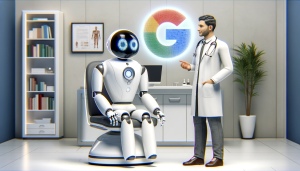
Google’s AI chatbot allegedly surpasses human doctors in text-based medical diagnoses
A study by Google has revealed that its AI chatbot, named Articulate Medical Intelligence Explorer (AMIE), demonstrated superior performance in diagnosing medical conditions compared to human physicians in text-based interactions, according to a recent report by The Register. This large language model, specifically trained for medical consultations, outshined human doctors in both diagnostic accuracy and communication quality.
In the experiment, 20 mock patients, each with fabricated illnesses, interacted with AMIE and 20 professional primary care physicians. The patients, unaware of whether they were conversing with the AI or a human doctor, were asked to evaluate the quality of their interactions across 149 case scenarios.
Most participants expressed a preference for AMIE, praising its empathetic, clear, and professional responses. This preference highlights the AI’s ability to maintain a consistent and focused demeanor, free from human constraints like fatigue or distraction.
More than just a conversational partner, AMIE also showcased a higher accuracy in diagnosing medical issues. However, Google is quick to clarify that this doesn’t imply AI chatbots are superior to human doctors in overall medical care. The real-world dynamics of healthcare, including in-person interactions and the development of patient-doctor relationships, play a crucial role in diagnoses and are beyond the scope of this text-based experiment.
The future of AI in healthcare
Google acknowledges the limitations of their study, emphasizing that the text-chat interface used in the experiment is not representative of typical clinical practices. The primary aim is not to replace human physicians but to supplement healthcare, especially for those with limited access.
The potential of AI systems like AMIE in healthcare is immense. They could be pivotal in scaling world-class healthcare globally. However, Google stresses the need for extensive research and development to ensure the safety, reliability, fairness, efficacy, and privacy of such technology before it can be responsibly implemented in real-world settings.
It’s important to emphasize that this was a Google-conducted study, focusing on a Google-developed AI chatbot. While the findings are promising for the potential use of AI in supporting healthcare, they are not a substitute for professional medical advice or treatment. ReadWrite does not advocate for individuals to rely on chatbots over real doctors, especially if they are experiencing health concerns. The primary goal of such AI systems, as stated by Google, is to support patients who might lack access to healthcare, not to replace human medical professionals.



